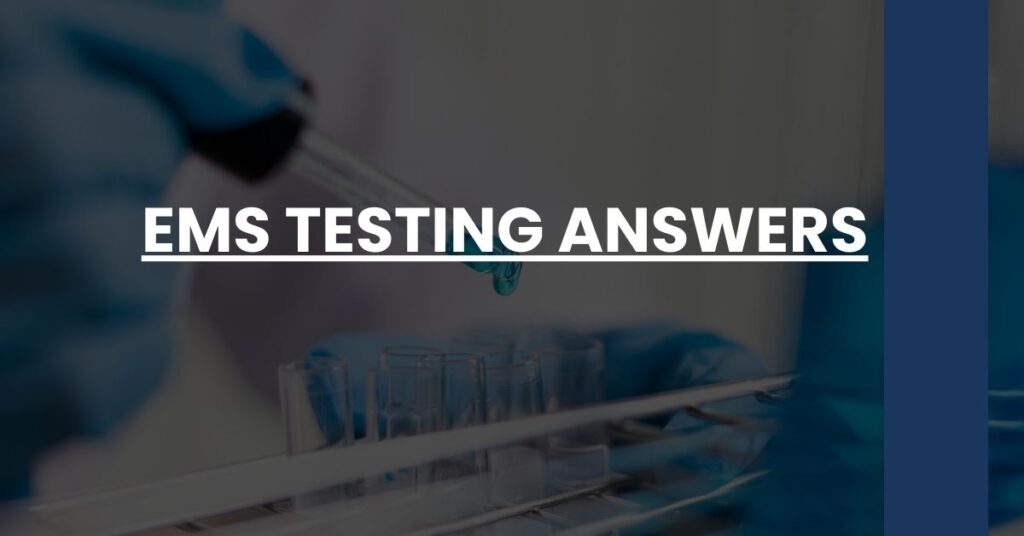Find EMS testing answers with our expert guide, designed to elevate your preparation strategy.
- Up-to-Date Exam Information: Get insights into the latest EMS testing formats and criteria.
- Study Resources and Tips: Access a curated list of resources for EMS test mastery.
- Common Q&As: Navigate through frequently asked questions with detailed EMS answers.
Secure your EMS certification with the right answers and strategies.
Understanding EMS Testing
Emergency Medical Services (EMS) testing is a pivotal step in your journey to becoming a qualified Emergency Medical Technician (EMT) or paramedic. These assessments not only measure your proficiency in medical knowledge and practical skills but also ensure that all certified responders can deliver high-quality care in emergency situations.
The Purpose of EMS Testing
The heart of EMS testing lies in safeguarding public safety. By employing a rigorous testing process, the EMS system maintains a standard that all practitioners must meet, which, in turn, builds trust within the community that you will serve.
Types of EMS Tests Used
There are two main types of EMS exams:
- Cognitive Exam: A written test assessing your understanding of medical concepts, patient assessment, and decision-making abilities.
- Psychomotor Exam: A hands-on practical test evaluating your capability to perform essential emergency care procedures.
Understanding the importance of these assessments is fundamental to appreciating the weight of the responsibility held by EMTs and paramedics. The integrity of the process is central to ensuring that every certified individual is capable of meeting the demands of this challenging field.
The Structure of EMS Examinations
EMS examinations consist of two distinct components: cognitive and psychomotor tests. Each is designed to assess different skill sets required by EMS professionals.
Cognitive Exam Breakdown
Through computer adaptive testing (CAT), the cognitive exam tailors itself to your ability level. This means questions adjust in difficulty based on your previous answers. Key areas covered in this exam are:
- Airway, Respiration & Ventilation: Assessing your knowledge of the airway management and ventilation.
- Cardiology & Resuscitation: Testing your understanding of cardiac arrest management and the use of AEDs.
- Trauma: Evaluating your ability to manage traumatic injuries.
- Medical & Obstetrics/Gynecology: Measuring your proficiency in handling medical emergencies and childbirth-related incidents.
The Psychomotor Exam
Complementing the cognitive exam, the psychomotor exam puts your hands-on skills to the test. You’ll be presented with scenarios that simulate real-life situations requiring emergency medical intervention. This assesses not only your technical capability but your ability to function under pressure. You’ll need to demonstrate proficiency in areas such as patient assessment, oxygenation, and spinal immobilization.
Preparing for the EMS Cognitive Exam
The key to excelling in the cognitive exam is a well-rounded preparation strategy that covers all the content areas you will encounter.
Content Areas to Focus On
To improve your chances of success, concentrate on these five crucial areas:
- Airway, Ventilation & Oxygenation:
- Cardiology:
- Trauma:
- Medical & Obstetrics/Gynecology:
Tips for Effective Studying
To efficiently absorb and retain the material covered on the exam, consider the following recommendations:
- Adopt an active study methodology — engage with the material through flashcards, practice questions, and group study sessions.
- Implement a structured study schedule to cover all content areas methodically.
- Utilize comprehensive study guides and practice tests to gauge your understanding and identify areas where further study is required.
Practical Skills Evaluation
The psychomotor exam is your opportunity to demonstrate that you have the hands-on skills necessary for pre-hospital care.
Key Skills Tested
Expect to be evaluated on a variety of practical skills, such as:
- Patient Assessment and Management:
- Cardiac Management:
- Airway and Breathing Techniques:
- Trauma Management:
Advice on Practicing Practical Skills
- Gain experience through hands-on practice in a controlled environment. This might include simulations or lab sessions.
- Review the National Registry skills sheets which provide a detailed outline of the skills and steps you’ll be assessed on.
- If possible, seek mentorship or guidance from experienced EMTs who can provide insights and feedback on your techniques.
Common Questions and Answers
When seeking EMS testing answers, you’ll likely have many questions about the process. The journey to becoming an EMT is rigorous, and it’s natural to seek as much information as possible to prepare effectively. Here, we’ve compiled some of the most common questions and provided informative answers to guide you through your EMS testing journey.
What Format Can I Expect in the Cognitive Exam?
- Multiple-choice questions: The cognitive exam predominantly features multiple-choice questions that assess your understanding across various emergency scenarios.
- Computer Adaptive Test (CAT): Your answers determine the difficulty level of subsequent questions, offering a customized assessment of your knowledge.
What Is the Difficulty Level of the EMS Exam?
The cognitive exam’s difficulty is subjective and varies from person to person. It is designed to challenge your knowledge and ensure that you are prepared for real-world scenarios. The key is consistent and comprehensive preparation. To better gauge the difficulty, consider taking advantage of practice tests which can simulate the examination experience.
What Constitutes a Passing Score on the EMS Exams?
- Scaled Scoring System: The EMS exams utilize a scaled scoring system. There isn’t a uniform passing percentage across all tests since the difficulty of questions can vary.
- Competency Measure: You must demonstrate an adequate level of competency across all tested areas to pass.
Are There Retest Policies If I Don’t Pass?
Yes, there are retest policies in place. Typically, you can retake the cognitive exam after 15 days, and you’re allowed a certain number of retakes within a two-year period. After three failed attempts, additional educational requirements may be imposed. It’s crucial to review the specific retest policies of the testing body to ensure you understand the parameters for retaking the exam.
Effective Study Methods and Resources
Engaging with the right materials and employing proven study methods can make all the difference in your preparation for the EMS exam. Focus on strategies and resources that will bolster your understanding and readiness.
Strategic Study Methods
Here are some effective strategies to sharpen your exam preparation:
- Active Repetition: Engage with the study material consistently to reinforce knowledge retention.
- Collaborative Learning: Study groups and peer discussion can clarify difficult concepts.
Utilize Varied Study Resources
When it comes to resources, diversity is your ally. Use a mix of materials to cover all bases:
- Comprehensive Textbooks: They provide in-depth coverage of EMS knowledge.
- Online Quizzes and Flashcards: Digital tools offer quick and accessible review options.
- Practical Workshops: Hands-on sessions can enhance your psychomotor skills.
Remember, the choice of study resources can have a significant impact on your ability to recall information during the test. Select materials that align with your learning style and ensure they are up-to-date with current EMS best practices.
Test-Taking Strategies for EMS Exams
Knowing the right answers isn’t the only key to success. Approaching the test with effective strategies can significantly boost your confidence and performance. Here are some test-taking tips tailored to the structure and demands of EMS exams:
- Understand the Question Fully: Before answering, take a moment to ensure you comprehend what’s being asked.
- Pace Yourself: Keep track of time but avoid rushing. Allow yourself a moment to think critically about each question.
- Educated Guesses: If you’re unsure, rule out obviously incorrect options first to improve your chances if you have to guess.
Staying calm under pressure is vital. Remember, the exam is designed to test your ability to think clearly during stressful situations, much like those you’ll encounter in the field.
After the Test: What Comes Next?
Post-test, you’ll eagerly await results while contemplating the transition from the classroom to a career in emergency services. Understandably, you’ll yearn for answers about what lies ahead.
After Receiving Your Exam Results
Upon passing the exam, you’ll be awarded certification, which is a testament to your knowledge and skills in the EMS field. If your results are not as hoped, review the retest policy and plan your next steps accordingly.
Certification and Recertification
Certification is the gateway to starting your career, while recertification ensures you stay updated with evolving EMS practices. Be proactive in continuing your education to maintain the high standards required.
Preparing for the Real-World
Real-life application of your skills presents a different set of challenges. Engage in additional training and exercises to sharpen your readiness for actual emergency scenarios. Mentorship and on-the-job experiences are invaluable as you step into this critical role in healthcare.
Conclusion: Your Pathway to EMS Certification
Your dedication to finding the right EMS testing answers and thorough preparation will set the foundation for a successful career in emergency medical services. Harness the knowledge and strategies outlined in this guide to navigate through the EMS examination process with confidence.
Remember, your journey doesn’t end with the exam; it’s just the beginning. As an aspiring EMT or paramedic, the commitment to continuous learning and improvement will distinguish you as a professional capable of making a difference in many lives. The path may be challenging, but the rewards of a career in emergency services are unparalleled in their impact and fulfillment. Embrace your role in this noble and essential field with determination and pride.
EMS testing answers revealed: Ace your EMT exam with expert strategies, essential study tips, and comprehensive preparation guidance.

